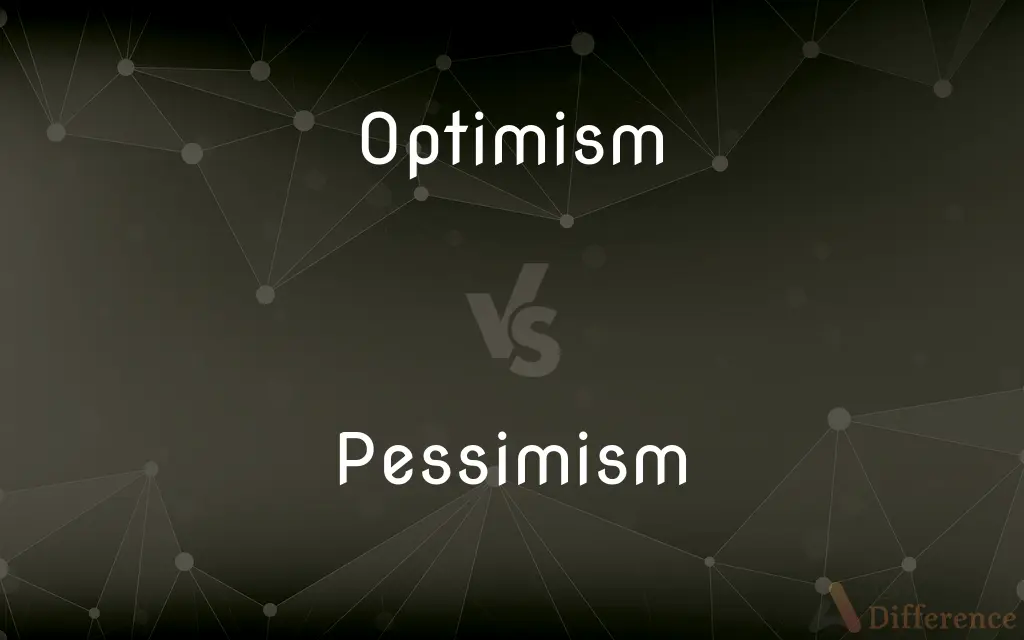Optimism vs. Pessimism — What's the Difference?
By Tayyaba Rehman & Fiza Rafique — Published on September 17, 2023
Optimism is the belief in positive outcomes and the goodness of situations, while pessimism is the expectation of negative outcomes and a focus on what could go wrong.

Difference Between Optimism and Pessimism
Table of Contents
ADVERTISEMENT
Key Differences
Optimism is the psychological tendency to look at the brighter side of life and expect favorable outcomes. This can have a positive impact on both mental and physical health. Pessimism, conversely, is the inclination to focus on potential downsides and prepare for the worst, which can sometimes lead to stress and anxiety.
Optimism often encourages a proactive approach, inspiring individuals to take action because they expect good results. Pessimism usually leads to a more cautious or defensive stance, as people are wary of negative outcomes and thus may avoid taking risks.
In the context of problem-solving, optimism can fuel creativity and resilience, allowing individuals to bounce back from setbacks more quickly. Pessimism may promote critical thinking and risk assessment, as anticipating problems can sometimes prevent them.
Optimism is frequently associated with increased longevity, better coping skills, and a higher quality of life. Pessimism, on the other hand, is often linked to higher levels of stress and a greater risk of health issues, although it can sometimes help in planning and preparation.
Comparison Chart
Outlook on life
Positive
Negative
ADVERTISEMENT
Approach to challenges
Proactive
Cautious/Defensive
Impact on mental health
Generally beneficial
Can be stressful
Effect on problem-solving
Boosts creativity
Promotes critical thinking
Risk-taking tendency
More likely
Less likely
Compare with Definitions
Optimism
Resilience: "Optimism fosters resilience in the face of adversity."
His optimism helped him bounce back from failure.
Pessimism
Negative Outlook: "Pessimism is the expectation of bad outcomes."
His pessimism made him dread the meeting.
Optimism
Positive Outlook: "Optimism is the expectation of good outcomes."
Her optimism made her believe she could succeed.
Pessimism
Defensive: "Pessimism leads to defensive behavior to avoid harm."
His pessimism led him to avoid any financial risks.
Optimism
Hopefulness: "Optimism involves a hopeful attitude."
Optimism kept him going even when times were tough.
Pessimism
Doubt: "Pessimism involves a lack of confidence in success."
Pessimism kept him from applying for the job.
Optimism
Future-Oriented: "Optimism is focused on positive future possibilities."
Her optimism makes her excited for what the future holds.
Pessimism
Present-Oriented: "Pessimism focuses on current problems and barriers."
Her pessimism keeps her from seeing beyond her current difficulties.
Optimism
Confidence: "Optimism is characterized by confidence in success."
Optimism led her to take risks in her business.
Pessimism
Cynicism: "Pessimism often manifests as cynicism."
Pessimism made her skeptical of everyone's intentions.
Optimism
A tendency to expect the best possible outcome or dwell on the most hopeful aspects of a situation.
Pessimism
A tendency to stress the negative or unfavorable or to take the gloomiest possible view
"We have seen too much defeatism, too much pessimism, too much of a negative approach" (Margo Jones).
Optimism
The doctrine, asserted by Leibniz, that this world is the best of all possible worlds.
Pessimism
The doctrine or belief that this is the worst of all possible worlds and that all things ultimately tend toward evil.
Optimism
The belief that the universe is improving and that good will ultimately triumph over evil.
Pessimism
The doctrine or belief that the evil in the world outweighs the good.
Optimism
A tendency to expect the best, or at least, a favourable outcome
I love her youth, her beauty and above all her optimism that everything will turn out fine.
Pessimism
A general belief that bad things will happen.
Optimism
The doctrine that this world is the best of all possible worlds
Pessimism
The doctrine that this world is the worst of all possible worlds.
Optimism
The belief that good will eventually triumph over evil
Pessimism
(computing) The condition of being pessimal.
Optimism
The opinion or doctrine that everything in nature, being the work of God, is ordered for the best, or that the ordering of things in the universe is such as to produce the highest good.
Pessimism
The opinion or doctrine that everything in nature is ordered for or tends to the worst, or that the world is wholly evil; - opposed to optimism.
Optimism
A habitual tendency or a present disposition to take the most hopeful view of future events, and to expect a favorable outcome even when unfavorable outcomes are possible; - opposed to pessimism.
Pessimism
A disposition to take the least hopeful view of things.
Optimism
The optimistic feeling that all is going to turn out well
Pessimism
The feeling that things will turn out badly
Optimism
A general disposition to expect the best in all things
Pessimism
A general disposition to look on the dark side and to expect the worst in all things
Common Curiosities
Is Optimism always good?
While optimism has many psychological and physical health benefits, excessive optimism can sometimes lead to poor decision-making.
How does Optimism affect health?
Optimism is generally linked to better mental and physical health, possibly due to reduced stress and healthier lifestyle choices.
What is Optimism?
Optimism is the mental attitude or world view that interprets situations and events as being best or having positive outcomes.
What is Pessimism?
Pessimism is the tendency to see the negative aspects of situations and to expect undesirable outcomes.
Is Pessimism always bad?
Pessimism often has a negative effect on emotional well-being but can be useful for risk assessment and planning.
How does Pessimism affect health?
Pessimism is often associated with higher stress levels, which can negatively impact health.
Can Optimism be learned?
Yes, cognitive behavioral techniques and mindfulness can help instill a more optimistic outlook.
Can Pessimism be unlearned?
Yes, with cognitive restructuring and mindfulness, one can adopt a more balanced perspective.
Can Optimism and Pessimism coexist?
Yes, many people have a balanced outlook that incorporates both optimistic and pessimistic elements.
Does Pessimism affect relationships?
Pessimism can strain relationships due to mistrust or constant worry.
Is Pessimism realistic?
Pessimism can be considered realistic when it helps in preparing for genuine risks and challenges.
Is Pessimism hereditary?
Pessimism may have a genetic component, but it is also heavily influenced by life experiences and environment.
Does Optimism affect relationships?
Optimism often positively impacts relationships by encouraging trust and collaboration.
Is Optimism realistic?
Optimism can be realistic when it’s based on factual grounds and balanced with critical thinking.
Is Optimism hereditary?
While there may be a genetic predisposition, environmental factors play a significant role in shaping optimism.
Share Your Discovery

Previous Comparison
Hypothesis vs. Premise
Next Comparison
Domicile vs. ResidenceAuthor Spotlight
Written by
Tayyaba RehmanTayyaba Rehman is a distinguished writer, currently serving as a primary contributor to askdifference.com. As a researcher in semantics and etymology, Tayyaba's passion for the complexity of languages and their distinctions has found a perfect home on the platform. Tayyaba delves into the intricacies of language, distinguishing between commonly confused words and phrases, thereby providing clarity for readers worldwide.
Co-written by
Fiza RafiqueFiza Rafique is a skilled content writer at AskDifference.com, where she meticulously refines and enhances written pieces. Drawing from her vast editorial expertise, Fiza ensures clarity, accuracy, and precision in every article. Passionate about language, she continually seeks to elevate the quality of content for readers worldwide.
















































